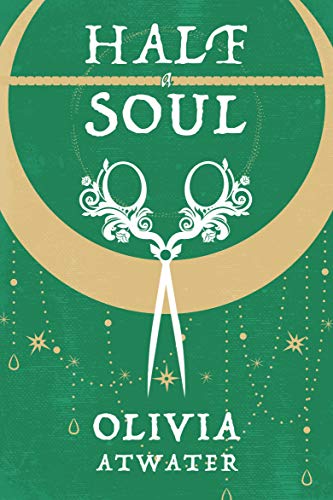views: 2459

Half a Soul
Regency Faerie Tales #1
by Olivia Atwater
Some of the best books are the ones that surprise you. I had just finished Project Hail Mary again and was looking for something new, but none of the books I have sitting in my Scribd queue looked interesting. I literally opened a dozen books -- fantasy, non-fiction, YA, sci-fi -- but nothing held my interest.
Half a Soul, however, was the exact right mix of old and new to actually hook me in. Set in an alt-universe London with magic and Faerie lords, this is a Regency era romance that more than fulfills its promises. Think Pride and Prejudice, if that was an urban fantasy novel.
The Lady
Theodora Ettings is a young woman on the verge of spinsterhood through no real fault of her own. After an encounter with a Faerie when she was a girl, Theodora (Dora for short) is left with only half of a soul. Strong emotions like anger, fear, happiness and embarrassment are difficult for her to feel at all, leaving her reactions muted and dull. As a result, she often commits social faux pas and has failed to attract any suitors at all.
Not that she cares, really. Dora is much more concerned with the happiness of her beautiful cousin, Vanessa, the only person who has shown her consistent kindness and also the reason that Dora is missing only *half* of her soul. When Vanessa goes to London to make her debut into society, Dora goes with her.
The last thing that Dora expects to find is love of her own...
The Gentleman
Lord Elias (more widely known as the Lord Sorcier) helped win a war, yet came back jaded and unhappy. Despite his new title -- or perhaps partly because of it -- he seems determined to make waves among the gentility. He is brusque, crass, and outright rude to the many lords and ladies of his aquaintance. Only his considerable powers of sorcery (and the favor of the Prince Regent) secure his position amongst London's elite.
When he meets Dora by chance, he instantly dismisses her as a dull-witted fool. Imagine his surprise when he discovers a sharp mind, level head and kindred soul lying underneath her unnaturally calm surface. She is the one woman he never failed to scandalize. But will that lead to love, or enmity?
The Good
My absolute favorite part of Half a Soul was Dora herself. Her view of the world, muted though it is, was still clearer and more honest than those of the people around her. I think that Half a Soul could be an attempt to creat an autistic (or austic-like) heroine, and I love it. Dora's lonliness, her struggle to understand her own emotions; her habit of mimicking the facial expressions and mannerisms of those around her so that she seems more normal; her confusion and disbelief when Elias begins to show interest; her tiny little hope, deeply burried, of being accepted for who she is -- all of it makes Dora very relatable to me. I am not diagnosed autistic, but I loved watching Dora move through London like a subtle current, changing people and circumstances in her path.
The Bad
There's not a lot to dislike in this novel, honestly. If I had to nitpick anything, it would be that the representation of Faerie is not very compelling. The Faerie lords and ladies are too childish and literal for my tastes. I didn't get the sense of ancient cunning and overwhelming danger that I have come to expect from other urban fantasy novels.
The Ugly
I didn't like how the big climax resolved itself. When Dora meets her other half in Faerie and Elias helps them to defeat Lord Hollowvale, I didn't at first understand why Theodora (Dora's other half) kills the Faerie Lord instead of just cutting the threads binding them there. Her motives became clear(er) by the end of the book (providing the stolen children with a good life, rather than just letting them die and saving Elias the guilt), but it wasn't transparent in the moment, leading to confusion.
I was also surprised by how smoothly the romance progressed between Elias and Dora. I have read other period romances, and they sort of condition you to expect some last-minute complication or misunderstanding that the hero and heroine must overcome to be together. This didn't happen with these two. They started off snarking at each other, growing to respect each other and falling in love, all at a believable pace. It wasn't bad -- I just kept waiting for the other shoe to drop and it never did.
Instead, the major complications come from Dora's family. Her aunt, in particular, is a very good antagonist. She has no regards for Dora's feelings or sense of belonging, because she literally does not believe Dora capable of feeling at all. This leads her to engage in many cruelties -- verbal and physical abuse -- which is, sadly, an all-too-common story in autistic families.
Conclusions
I was not anticipating liking this book as much as I did. Dora's voice and mannerisms are just so utterly unique and charming; I felt instantly drawn to her and I loved how Dora never had to be "fixed" for Elias to fall in love with her. She found her own place in the world, just as she was.
And that is a very happy ending, indeed.
Comments